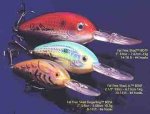Why they strike artificials

We have learned a great
deal about bass fishing in recent history, but we can still go out with the
best equipment, do all the "right things" and still not see a fish
-- much less catch one. Fishing deflates more big egos than any other sport.
You either catch them or you don't. There's no in-between.
Itís amazing that in
spite of all the research and studies done on bass, the average angler's
catching average is still way down. It's that kind of sport.
Besides heredity, I think thereís another cause of baldness in male bass
anglers, Itís from all the head scratching that goes on when searching for
that elusive fish.
Ever wonder why bass strike at something? Why would a bass hit an artificial
lure? Some lures look like natural food, but most have little resemblance to
anything normally found in the water. Yet, bass are attracted to and will
strike bits of plastic, wood and metal with hooks attached.
Why? Are they dumb, or just so hungry they don't care? What makes them tick?
5 senses, plus 1
Largemouth bass have the five major senses common to most animals: hearing,
sight, smell, taste and touch.
They also have another sense, the lateral line, which is a series of sensitive
nerve endings that extends from just behind the gill to the tail on each side
of the fish. The lateral line can pick up underwater vibrations as subtle as a
swimming baitfish. This allows the fish to detect something in the murkiest
water.
Bass hear with internal ears located within the skull. When they hear
something familiar and interesting, they zone in on it. But, a loud,
unfamiliar sound will have them swimming for deeper water or cover.
Bass can see in all directions, except directly below or behind. Experts say
that in clear water bass can see 30 feet or more. In most bass waters, though,
their visibility is limited to 5 to 10 feet. And, as you may know, they can
also see objects that are above the water. Sometimes when blind-casting into
an area, you will see the swirls of fish taking off even before your lure hits
the water. They see it coming and they are out of there.
The eye of a bass absorbs more light than does the human eye. This enables
bass to see their food in dim light or darkness. They will feed any time of
day or night, but experts say they are less inclined to leave cover and search
for food in bright conditions. Bass like shade and low-light conditions -- the
better to ambush prey.
Smell is not a real big deal with bass, as compared to catfish, trout and
such. They smell through nostrils located on their snout. Water is drawn
through the nostrils and expelled without entering the throat. Experts say,
like most fish, bass can detect minute amounts of scent in the water.
Bass use their sense of touch to determine whether to reject or swallow an
object. They will normally hold on to a soft-bodied, plastic worm longer than
a metal lure.
There was a sequence in the original video, "Bigmouth," that floored
me. An angler cast out a crankbait and was reeling it in with a slow, but
steady, movement. An underwater camera captured an amazing thing: A largemouth
bass inhaled the lure and spit it out so quickly the angler never knew it
happened. The flow of the line was never interrupted as the angler kept
reeling the lure back to the boat.
As for the sense of taste, bass have few taste cells in their mouths and this
sense is not as important to them as to some other species of fish.
6 reasons drive
urge to strike
Okay, now back to our main question. What causes a fish to bite? Some
fisheries scientists have come up with six reasons why bass strike lures:
- Hunger. This is the
primary reason. Fish feed like other creatures and when a lure appears as
something they would like to eat, they strike.
- Protection. During
spawning season, fish that provide parental care for their young or the
unborn eggs will protect their nests. You can see this by tossing a lure
into a spawning nest and watch the reaction -- an immediate strike.
- Greed. A fish will
rush to strike something "before the other fish gets it." This
can be seen around docks where one or two big fish spend their time
keeping smaller fish away from any food tossed into the water. In a lake
or stream, big fish take up the best feeding stations and keep all others
away by being there first when food happens by.
- Gluttony. Even with
full stomachs, they will strike a lure. Some experts say bass will
regurgitate what's in their stomachs in order to strike a lure!
- Provocation. Fish
can be provoked into striking. Bass in aquariums have been observed doing
this. They'll ignore a lure only so long and then bust it in a seeming fit
of anger.
- Reflex. They sense
something nearby and automatically go after it, often getting hooked in
the process.
An important thing to
remember: As the water warms, the metabolism of bass increases and they feed
more. Fish feed most actively in water temperatures ranging from 68 to 80
degrees F. -- Story by Marvin Spivey
